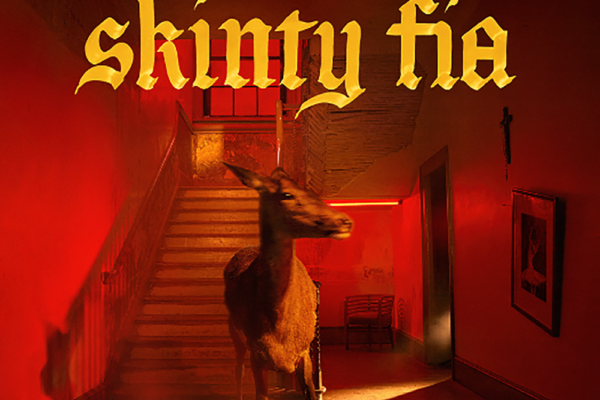In the early 2000s, Hardcore was gaining in popularity. It was abrasive and monotone—not unlike the lesser moments on Lou Reed and Metallica’s Lulu if Lou screamed from his belly the entire time. To this day, I can’t find much I personally like in it.
Some hardcore bands would play the teen center where I volunteered. And while I wasn’t a fan of most, there was one band that I enjoyed. It was like any of the others, except the brass section. After an assault of palm muted riffs there would come the brass section playing these melodic phrases until the band started chugging back into the original verses.
I forget the name of the band, but I was excited when they came around. And I came to believe in a loose rule: People love brass sections. It explains the enduring popularity of ska and the whimsy of Oom-Pah bands (like the one in Reed’s “Goodnight Ladies”). The brass section has the power to please, so when it’s put to good use like on the new self-titled EP from Jesus on the Mainline, it’s more than a pleasure.
“War,” the first track on this EP, begins like what that Hardcore band sounds in my memory. It is the sound of chaos, intentionally mimicking a marching army before hoisting us into a triumphal crescendo of brass. Who won the war? I’m not sure, half the lyrics are obscured with a distortion effect, and the chorus is just “heys” and “ohs”.
By the end of the song a few things about the band become clear. One, they have a Civil War thing going on. And two, there’s a lot of people in this band. Like the Polyphonic Spree, Broken Social Scene, or the Japanese Crime Syndicate, there seem to be an untold number of members.
The next two songs, “Sister City, Brother Bone” and “Angel From Montgomery,” cement this band as revivalist. Throughout the tracks the music is strong, including the melodies, but the lyrics rely too heavily on the Mumford & Sons dustbowl lyrics that are so popular. It brings to mind the Jeff Tweedy skit from Portlandia where he is reduced to singing about a smoke alarm going off.
The trombone solo in “Sister City” is bluesy where it could have been more melancholy, to greater effect, something they achieve in “Angel.” It features some of the best horn arrangements on the EP, and a guitar tone with the nicest sustain/reverb I’ve heard in a while.
“Sweet High & Dry” follows “Angel” nicely. Sounding like it could have been an outtake from Ryan Adam’s “Gold”, the whole song coheres in a way that the rest of the album aims for. The chorus hits all the right notes. The organ is perfect. The outro is bittersweet; you don’t want it to end. But again, the solo aims too clean, this time on guitar.
“Jump Right In” is the weakest track on the EP. It is that faster upbeat song that has to be on every album after two slow songs. You can jump right in anywhere in the track and feel like you haven’t made any progress. I would have argued against its inclusion solely with run-time in mind (the EP is longer than Revolver).
It’s pretty obvious that these guys and gals have worn out the grooves on their copies of The Band’s debut, and “The Last Place That Love Lives” is the most exemplary of that. It’s a powerful tune, and one that they flexed their songwriting muscles on. Though forcing the end into double time created an inverse proportion—as the time doubled, the depth was halved, undermining a great closing track and the most beautiful song on the album.
It’s also evident that this band has potential outside the studio. Nowhere is that more clear than the cover of “Lithium” that closes the EP. The Nirvana track is not an easy one to pull off (I can’t even sing along when I’m in my car). Their arrangement is novel, but also not disturbingly altered in the way Tori Amos’ “Smells Like Teen Spirit” is, or straightforward like every other Nirvana cover. On their website, they talk of selling out shows left and right, and who wouldn’t want to see the band that pulled this off live?
This EP is full of great moments, but also some flaws, most of which could be fixed if they brought in the spontaneity of that live performance onto the rest of the album. And that’s the key. Spontaneity is about living in the present. I’d say do away with the revivalism of Civil War tropes. 2014 is hectic enough.
Just don’t do away with the horns. People love a good brass section.
Article by: Christopher Gilson




